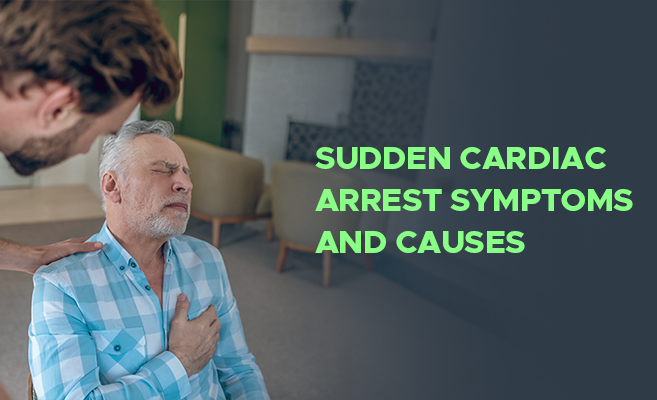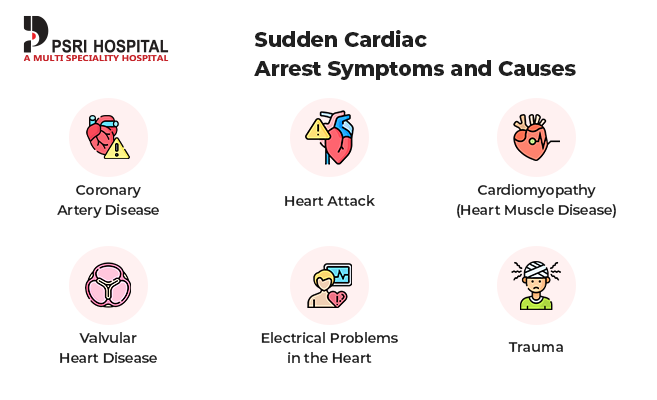Sudden Cardiac Arrest Symptoms and Causes

Heart is a vital organ that pumps blood and oxygen throughout the body. A sudden cardiac arrest is a life-threatening emergency that occurs when the heart unexpectedly stops functioning properly. Understanding the symptoms and causes of cardiac arrest can help save lives through quick treatment and prevention. With advanced cardiac life support measures, survival is possible if treatment is obtained within the first several minutes. Prevention is also key, as those who have had a cardiac arrest are at higher risk for recurrence. Here, we are going to explore symptoms and causes of cardiac arrest, the crucial differences between cardiac arrest and a heart attack.
Cardiac Arrest vs. Heart Attack
There is a fundamental difference between a heart attack and a cardiac arrest. A heart attack happens when blood flow to a part of the heart is blocked, usually by a blood clot, leading to heart muscle damage. Symptoms include chest pain, discomfort in other areas of the upper body, and shortness of breath. In contrast, cardiac arrest is an electrical malfunction causing the heart to stop beating unexpectedly. A heart attack can lead to cardiac arrest, but the two are not synonymous.

Causes of Cardiac Arrest
The journey to a cardiac arrest often begins with the heart’s electrical system failing, but the reasons behind this can vary widely:
Coronary Artery Disease: The most common cause, where arteries supplying blood to the heart get blocked or narrowed. It leads to reduced blood flow to the heart.
Heart Attack: A sudden blockage of blood flow to the heart can trigger cardiac arrest. It can cause scarring of heart tissue, affecting electrical signals.
Cardiomyopathy (Heart Muscle Disease): Weakens the heart, making it harder to pump blood and maintain proper electrical rhythms.
Valvular Heart Disease: Problems with the heart valves can lead to cardiac arrest.
Affects how blood flows through the heart.
Congenital Heart Disease: Birth defects in the heart’s structure can cause cardiac arrest.
Can alter the normal flow of blood through the heart.
Electrical Problems in the Heart: Issues like arrhythmias can disrupt the heart’s rhythm.
Can prevent the heart from beating effectively.
External Factors: Certain situations and conditions outside the heart can also precipitate cardiac arrest, such as:
- Trauma: Severe physical injury can lead to cardiac arrest.
- Drug Overdose: Certain substances can disrupt the heart’s electrical system.
- Drowning: Lack of oxygen from drowning can cause the heart to stop.
Symptoms of Cardiac Arrest
When cardiac arrest strikes, it does so suddenly, and the signs are clear if you know what to look for. Here are some major symptoms of cardiac arrest:
Sudden Collapse: The person falls unconscious abruptly, unable to respond.
- No response to tapping on shoulders.
- Does not react to being called by name.
Abnormal Breathing: Either stops breathing or only gasps for air, not normal breathing.
Preceding Symptoms: Some symptoms may appear minutes before collapse, including:
- Fatigue: Feeling unusually tired without a clear reason.
- Dizziness: Experiencing lightheadedness or vertigo.
- Fainting: Suddenly passing out or feeling like you might faint.
- Chest Pain: Experiencing discomfort or pain in the chest area.
- Shortness of Breath: Finding it difficult to breathe normally.
- Weakness: Feeling weak unexpectedly.
- Heart Palpitations: Heart feels like it’s pounding, fluttering, or beating irregularly.
Lifesaving Treatments for Cardiac Arrest
When cardiac arrest occurs, immediate and effective treatment is crucial to save a life. Here is what is typically involved:
Immediate Response
CPR (Cardiopulmonary Resuscitation): An urgent action to manually support heart function and blood circulation.
- Performed by pressing on the chest to mimic the heart’s pumping.
- Includes mouth-to-mouth resuscitation to provide oxygen.
Defibrillation: Uses an automated external defibrillator (AED) to send an electric shock to the heart. It aims to reset the heart’s rhythm to a normal pattern.
Hospital Treatments
Medication: Administered to stabilize heart rhythm and support heart function.
Implantable Cardioverter-Defibrillator (ICD): A device implanted to monitor heart rhythms and deliver shocks if dangerous rhythms are detected.
Coronary Angioplasty: A procedure to open blocked arteries that may have contributed to cardiac arrest. It involves inserting and inflating a tiny balloon at the site of the blockage.
Aftercare and Ongoing Management
Surviving a cardiac arrest is just the beginning of the journey. Here is how ongoing care from a best cardiac hospital in India and management play a vital role in recovery and future prevention:
Regular Check-Ups: Visiting the cardiologist regularly to monitor heart health and adjust treatments as needed. Also, includes routine tests to check the heart’s electrical activity and function.
Medication Management: Taking prescribed medications to manage heart conditions and prevent future cardiac arrests. Regularly reviewing and adjusting medications with healthcare providers.
Rehabilitation Programs: Participating in cardiac rehabilitation to rebuild strength and improve heart health. It includes supervised exercise, lifestyle education, and support.
Healthy Eating: Adopting a heart-healthy diet low in saturated fats, cholesterol, and sodium.
Physical Activity: Incorporating regular, moderate exercise as recommended by healthcare providers.
Smoking Cessation: Quitting smoking to reduce heart disease risk.
Stress Management: Learning and practicing stress-reduction techniques.
Avoiding Triggers: Staying away from activities or substances that can trigger heart problems.
Conclusion
Cardiac arrest poses a sudden and serious threat to life, underscoring the importance of awareness, quick response, and expert care. By understanding the symptoms and causes of cardiac arrest, recognizing the difference from a heart attack, and knowing the treatments available, individuals can be better prepared to act in critical moments. PSRI Hospital is the best hospital for heart surgery in India, ready to support patients and their families through every step of their heart health journey. Trust in PSRI Hospital – a top hospital in Delhi for compassionate, comprehensive cardiac care that makes heart health a priority.
FAQs
What are the first things to do if someone has a cardiac arrest?
Ans. Immediately call for emergency help and start CPR. If available, use an automated external defibrillator (AED) as soon as possible.
Can you survive a cardiac arrest without immediate treatment?
Ans. Survival chances significantly decrease without immediate CPR and defibrillation. Quick response is crucial to survival and recovery.
What lifestyle changes can help prevent a cardiac arrest?
Ans. Eating a heart-healthy diet, exercising regularly, quitting smoking, managing stress, and avoiding known triggers are key to preventing cardiac arrest.
How often do I need to see a doctor after surviving a cardiac arrest?
Ans. Follow-up frequency varies depending on individual health conditions, but regular check-ups with a cardiologist are essential for ongoing management and prevention.

 Book An Appointment
Book An Appointment Virtual Consultation
Virtual Consultation





